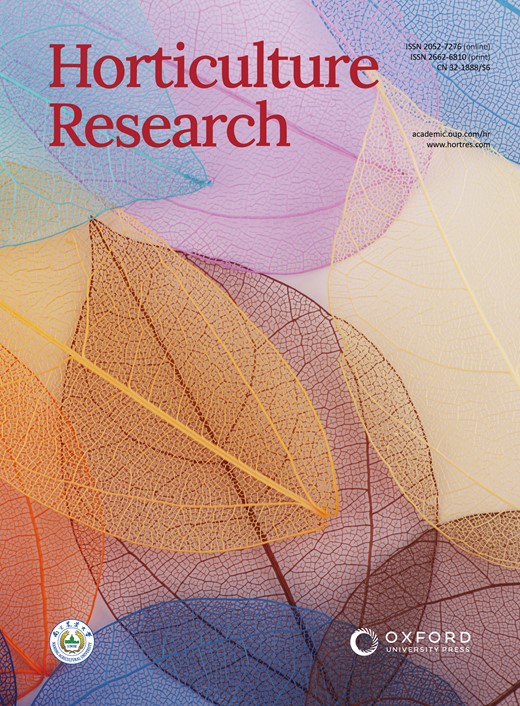Local and systemic transcriptome and spliceome reprogramming induced by the root-knot nematode Meloidogyne incognita in tomato
IF 8.7
1区 农林科学
Q1 Agricultural and Biological Sciences
引用次数: 0
Abstract
Root-knot nematodes (Meloidogyne spp.) are widely spread root parasites that infect thousands of vascular plant species. These highly polyphagous nematodes engage in sophisticated interactions with host plants that results in the formation of knot-like structures known as galls whose ontogeny remains largely unknown. Here, we determined transcriptome changes and alternative splicing variants induced by Megalaima incognita in galls and neighboring root cells at two distinct infective stages. M. incognita induced substantial transcriptome changes in tomato roots both locally in galls and systemically in neighboring cells. A considerable parallel regulation of gene expression in galls and neighboring cells were detected, indicative of effective intercellular communications exemplified by suppression of basal defense responses particularly during the early stage of infection. The transcriptome analysis also revealed that M. incognita exerts a tight control over the cell cycle process as a whole that results in an increase of ploidy levels in the feeding sites and accelerated mitotic activity of the gall cells. Alternative splicing analysis indicated that M. incognita significantly modulates pre-mRNA splicing as a total of 9064 differentially spliced events from 2898 genes were identified where intron retention and exon skipping events were largely suppressed. Furthermore, a number of differentially spliced events were functionally validated using transgenic hairy root system and found to impact gall formation and nematode egg mass production. Together, our data provide unprecedented insights into the transcriptome and spliceome reprogramming induced by M. incognita in tomato with respect to gall ontogeny and nematode parasitism.番茄根结线虫诱导的局部和系统转录组和剪接组重构
根结线虫(Meloidogyne spp.)这些具有高度多食性的线虫与寄主植物发生复杂的相互作用,形成被称为虫瘿的结状结构,而虫瘿的本体发育过程在很大程度上仍是未知的。在这里,我们确定了在两个不同的感染阶段,Megalaima incognita 在虫瘿和邻近根细胞中诱导的转录组变化和替代剪接变体。M. incognita在番茄根部诱导了大量转录组变化,包括局部的虫瘿和系统性的邻近细胞。研究发现,虫瘿和邻近细胞中的基因表达有相当大的平行调控,这表明细胞间的交流非常有效,特别是在感染的早期阶段,基础防御反应受到抑制。转录组分析还显示,M. incognita 对整个细胞周期过程进行了严格控制,导致取食部位的倍性水平上升,并加速了虫瘿细胞的有丝分裂活动。替代剪接分析表明,M. incognita能显著调节前mRNA剪接,从2898个基因中发现了9064个差异剪接事件,其中内含子保留和外显子跳过事件在很大程度上被抑制。此外,我们还利用转基因毛根系统对一些差异剪接事件进行了功能验证,发现它们对虫瘿形成和线虫产卵量有影响。总之,我们的数据为了解西红柿中的M. incognita诱导的转录组和剪接组的重编程提供了前所未有的见解,这些重编程与虫瘿的发育和线虫的寄生有关。
本文章由计算机程序翻译,如有差异,请以英文原文为准。
求助全文
约1分钟内获得全文
求助全文
来源期刊

Horticulture Research
Biochemistry, Genetics and Molecular Biology-Biochemistry
CiteScore
11.20
自引率
6.90%
发文量
367
审稿时长
20 weeks
期刊介绍:
Horticulture Research, an open access journal affiliated with Nanjing Agricultural University, has achieved the prestigious ranking of number one in the Horticulture category of the Journal Citation Reports ™ from Clarivate, 2022. As a leading publication in the field, the journal is dedicated to disseminating original research articles, comprehensive reviews, insightful perspectives, thought-provoking comments, and valuable correspondence articles and letters to the editor. Its scope encompasses all vital aspects of horticultural plants and disciplines, such as biotechnology, breeding, cellular and molecular biology, evolution, genetics, inter-species interactions, physiology, and the origination and domestication of crops.
 求助内容:
求助内容: 应助结果提醒方式:
应助结果提醒方式:


